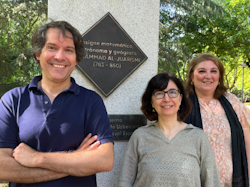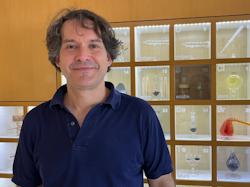Andrés, what is it like to be a member of the Una Europa Self-Steering Committee in Future Materials and Technologies?
I have been involved in the alliance’s Self-Steering Committee in Future Materials and Technologies since the beginning, representing the perspective of chemistry and biochemistry. I was invited to be involved by my university due to my experience in research; I have a consolidated research group myself, with European-funded projects mainly focused on Nanotechnology.
I represent Universidad Complutense de Madrid on the Self-Steering Committee with two of my colleagues – Arantzazu Mascaraque, from the School of Physics and Co-Chair of the Self-Steering Committee; and María Josefa Herrero, from the School of Geology. Together we create an interdisciplinary group across different faculties, bringing different views and perspectives on the theme of Future Materials and Technologies. We have been working together in Una Europa for around three years and we have a good working relationship; we created a good triangle.
Working with colleagues from the different Una Europa universities in the Self-Steering Committee means we try to solve problems as partners, not as individual institutions. We are also connecting researchers at our universities to go off and create their own projects, which is really nice. We are really trying to create something new together.

Andrés Guerrero-Martínez with fellow UCM Self-Steering Committee members Arantzazu Mascaraque and María Josefa Herrero.
Your university is hosting the Una Europa Summer School 2025 in Future Materials and Technologies. Can you give us an overview?
The theme of the Summer School is, ‘Innovative Methods in Future Materials’, which includes all aspects related to the development and study of future materials and therefore captures all the universities and expertise that belong to this Una Europa Self-Steering Committee. We wanted to offer the Summer School participants an enriching interdisciplinary experience, while working together with colleagues from other universities.
At the Summer School we will focus on methods for materials characterisation, exploring specific characterisation techniques such as spectroscopy, microscopy, and diffraction. Participants will use these methods to understand the correlation between the structure of matter and the properties of that matter – how can we extract knowledge about the properties of these materials and the potential of these materials in different applications?
The idea behind the Summer School is to increase knowledge in innovative methods related to the preparation and characterisation of advanced materials, materials that could be interesting for the future. For instance, we will explore topics linked to sustainability and resources, and energy efficiency. We also aim to highlight, promote and consolidate the activities of the Self-Steering Committee [in Future Materials and Technologies], to strengthen collaboration between the different members of Una Europa.
Why does the Summer School champion an interdisciplinary approach to Future Materials?
To understand methods for the preparation of new materials, we must include experts from chemistry, physics and geology, but also other innovative approaches. For example, in the Self-Steering Committee we also involve colleagues from biology, engineering, and other areas of science. We are keen to show students the interdisciplinary character of Future Materials and technologies, and also the importance of collaboration. It is exciting to think that researchers who meet at the Summer School could, maybe, work together in the future, either in research or in academia.
" With the participants interacting with each other, they may find a new way to approach their area of study from another researcher, or a professor, or discover other training they could do to enhance their research. Creating those connections between the students and researchers in Una Europa – that will be fantastic. "
Andrés Guerrero-Martínez on what he is looking forward to from the Summer School.
Una Europa Summer Schools aim to support doctoral researchers in strengthening their research careers.
How will the Summer School achieve this?
The Summer School programme includes two poster sessions for the participants to present on their own research. There will be some awards for the best posters and presentations, which will be decided by academics and professors from the different Una Europa partner universities.
We will also have a roundtable with young researchers, for example Marie Curie Fellows or Fellows with the Spanish national programme, discussing the early stages of an academic research career. We have invited young researchers from the Faculties of Chemistry, Physics and Geology [at Universidad Complutense de Madrid] to share some tips on how to build a future in research or academia.
What are you most looking forward to from the Summer School?
I am really interested in showing the participants the big picture of using innovative methods to understand and study novel materials. We want to encourage the researchers to not only be focused on the technique or method they are using in their PhD or master’s programme, but the full scope of possibilities available to study these chemical or physical systems, especially in relation to experimental and computational techniques and the use of AI.
With the participants interacting with each other, they may find a new way to approach their area of study from another researcher, or a professor, or discover other training they could do to enhance their research. Creating those connections between the students and researchers in Una Europa – that will be fantastic.
This reflects my own experience. I have friends and colleagues that I met at a Congress, or a Summer School, and now we are collaborating together; but even more, we are friends. This is really what I would like from the Summer School; this would be the ideal for me.
Do you have a final message for the Summer School participants?
Enjoy Madrid in summertime! It’s fantastic – full of sun, full of light, full of places to have a drink together and chat. That would be my advice.
The Una Europa Summer School: Innovative Methods in Future Materials taking place at the Faculty of Physical Sciences, Universidad Complutense de Madrid from 23–27 July 2025.
Learn more about Una Europa Summer Schools for doctoral researchers



